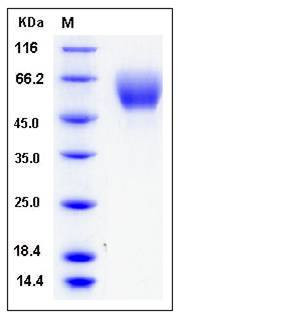Mouse SerpinA6 / CBG Protein (His Tag)
AI265318,AV104445,Cbg
- 100ug (NPP3475) Please inquiry
| Catalog Number | P50314-M08H |
|---|---|
| Organism Species | Mouse |
| Host | Human Cells |
| Synonyms | AI265318,AV104445,Cbg |
| Molecular Weight | The secreted recombinant mouse SERPINA6 comprises 386 amino acids with a predicted molecular mass of 43.7 kDa. As a result of glycosylation, it migrates as an approximately 50-60 kDa band in SDS-PAGE under reducing conditions. |
| predicted N | Val 23 |
| SDS-PAGE |  |
| Purity | > 98 % as determined by SDS-PAGE |
| Protein Construction | A DNA sequence encoding the mouse SERPINA6 (Q06770) (Met 1-Ala 397) was fused with a polyhistidine tag at the C-terminus. |
| Bio-activity | |
| Research Area | Immunology |Inflammation / Inflammatory Mediator |Plasma Cascade Systems in Inflammation |Fibrinolysis System |
| Formulation | Lyophilized from sterile PBS, pH 7.4 1. Normally 5 % - 8 % trehalose and mannitol are added as protectants before lyophilization. Specific concentrations are included in the hardcopy of COA. |
| Background | Corticosteroid-binding globulin (CBG), also known as SerpinA6, is a non-inhibitory member of the serine proteinase inhibitor (serpin) superfamily. It is the high-affinity transport protein for glucocorticoids in vertebrate blood. CBG is specifically cleaved by this protease at a precise site close to its carboxy-terminus. This induces a conformation change and disrupts the binding between glucocorticoids and CBG, and promotes a significant and local release of glucocorticoids (over 90% of them are bound to CBG in human plasma). In this context, CBG directs glucocorticoids to sites of inflammation, and plays in consequence a crucial role in efficient glucocorticoid action in physiology. The SerpinA6 protein is mainly secreted by the liver. This negative acute phase protein regulates free cortisol levels in the blood and distributes cortisol to its target tissues. SerpinA6 deficiency is an extremely rare hereditary disorder characterized by reduced corticosteroid-binding capacity with normal or low plasma corticosteroid-binding globulin concentration, and normal or low basal cortisol levels associated with hypo-/hypertension and muscle fatigue. There are three heritable, human CBG gene mutations that can reduce CBG-cortisol binding affinity and/or reduce circulating CBG levels. |
| Reference |
